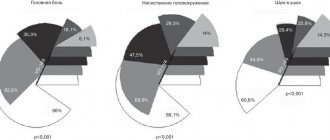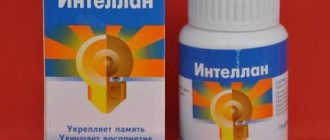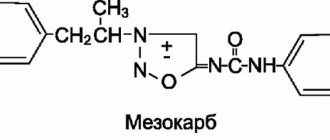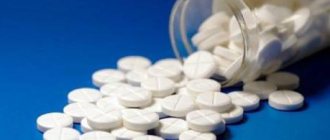Citramon is a combined Ukrainian drug from the group of non-narcotic analgesics, which combines the properties of an antipyretic, eliminates pain and inflammation and reduces temperature. The composition of the drug is a complex of three substances:
- acetylsalicylic acid (aspirin), the mechanism of action of which is to reduce the production of prostaglandins in the hypothalamus and foci of inflammation. Under the influence of aspirin, platelet aggregation decreases and the blood thins,
- paracetamol, which interacts with the thermoregulation center of the hypothalamus, which leads to a decrease in temperature,
- thirty mg of caffeine, under the influence of which blood vessels dilate and blood circulation in the brain increases, as a result pain and spasms are eliminated, drowsiness is reduced and the patient’s performance increases.
Due to the interaction of the components, the medicine has a triple pharmacological effect:
- analgesic,
- antipyretic,
- anti-inflammatory.
Citramon, indications for use
The medication is used:
- for relieving mild to moderate headaches and toothaches,
- dysmenorrhea and migraines,
- for arthralgia and neuralgia,
- fever with influenza and ARVI,
- for headaches associated with hypotension.
Citramon for the head helps to cope with tension pain and spasms in blood vessels that patients suffer from when the weather changes. The medicine acts ten minutes after entering the body. Citramon for low blood pressure eliminates weakness, dizziness and frequent pressing pain in the temples during hypotension. Citramon for toothache relieves symptoms of dentalgia and reduces inflammation in 25 minutes, but the patient should not postpone a visit to the dentist. Citramon for menstrual pain reduces pain in the lower abdomen in women that occurs with dysmenorrhea. If necessary, the single dose is increased to two tablets.
What do Citramon tablets help with?
The main purpose of the drug is to relieve moderate and mild pain in the presence of concomitant diseases:
- ARVI;
- flu;
- general malaise;
- febrile syndrome;
- neuralgia;
- arthralgia;
- algodysmenorrhea;
- migraine;
- myalgia;
The drug is used to treat headaches, muscle pain, dental pain, and joint pain. "Citramon" is effective in relieving any pain that is associated with inflammatory processes. It contains several active components that mutually enhance each other's actions.
Contraindications for use
Citramon tablets are not used in treatment for:
- hypersensitivity in patients to the active and auxiliary components of the drug,
- congenital hyperbilirubinemia,
- alcoholism,
- vascular spasms,
- acute pancreatitis,
- erosions in the gastrointestinal tract and gastrointestinal bleeding,
- bronchial asthma, which is caused by taking aspirin and NSAIDs,
- dysfunction of the liver, kidneys and diabetes mellitus in severe forms,
- hemorrhagic diathesis,
- hemophilia, anemia and leukopenia,
- pregnancy and breastfeeding,
- slow blood clotting,
- angle-closure glaucoma,
- epilepsy and hyperthyroidism,
- atherosclerosis,
- thrombosis and thrombophlebitis,
- arterial hypertension and severe forms of ischemic heart disease,
- sleep disorders and increased excitability.
The drug is not used in the treatment of elderly patients. The medicine is not prescribed to children for the treatment of viral diseases and influenza, since acetylsalicylic acid provokes the development of Reye's syndrome.
"Citramon": composition and other characteristics
"Citramon" is an anesthetic that prevents inflammatory processes and also has an antipyretic effect. The only form of release is tablets. They are packaged in cardboard packages, each containing 10 or 6 pieces.
The active ingredient is acetylsalicylic acid (240 mg per tablet). The following are used as auxiliary components:
- citric acid (20 mg);
- phenacetin (180 mg);
- caffeine (20 mg).
The composition and dosage of components may vary significantly, as determined by manufacturers. The features of the tablet may also differ. For example, “Citramon Ultra”, unlike the classic “Citramon”, is a drug with film-coated tablets. This makes oral administration easier.
The effect on the body is complex:
- Acetylsalicylic acid reduces temperature and resists inflammatory processes.
- Caffeine stimulates excitation processes in the central nervous system and activates the brain.
- In combination with acetylsalicylic acid and paracetamol, the drug has a pronounced analgesic effect.
The product is available freely and does not require a prescription. Stored at normal room temperature up to 25 degrees. The shelf life is 2 years from the date of production.
For reference
One of the common types of the drug is Citramon P. Along with the main components, it contains paracetamol, which enhances the analgesic and antipyretic effect.
Side effects
Usually the drug is well tolerated, but sometimes the components that make up the drug can cause adverse reactions:
- hypoglycemia,
- allergies, in the form of anaphylaxis and rhinitis, itching, rash and urticaria, angioedema and bronchospasm in patients who suffer from hypersensitivity to aspirin and NSAIDs,
- a complex of gastrointestinal disorders that are accompanied by dyspepsia, nausea and vomiting, heartburn, stomach pain and erosive and ulcerative lesions of the gastrointestinal tract,
- dysfunction of the liver and gallbladder, in which the activity of liver enzymes increases and hepatonecrosis develops,
- disorders of the heart, which are manifested by arrhythmia, tachycardia and arterial hypertension,
- disorders of the nervous system, which are complicated by headache and dizziness, tremor and paresthesia, anxiety and sleep disturbances, weakness and ringing in the ears,
- malfunction of the circulatory system, which is manifested by a decrease in platelets and leukocytes in the blood, anemia and agranulocytosis and hematomas.
Due to the content of acetylsalicylic acid in the medication, patients have an increased risk of bleeding.
Cases of overdose
In small quantities, an overdose leads to ringing in the ears, nausea, vomiting, dizziness, and pale skin. In case of severe overdose, more serious disorders are observed:
- breathing problems;
- circulatory disorders;
- increased anxiety;
- feeling dazed;
- headache;
- nausea;
- bleeding;
- sweating;
- fatigue, increased drowsiness;
- convulsions;
- extremely rarely - coma.
In these cases, you must immediately stop taking the drug and its analogues with the same active ingredients. If the symptoms are severe, you will need to seek emergency medical help.
List of used literature
- Directory of drugs Compendium;
- State register of medicinal products.
Popular questions about Citramon
How to take Citramon?
Adults are prescribed orally - one tablet or capsule two to three times a day at the end of a meal, which is swallowed and washed down with water. You should not take more than six tablets per day.
How does Citramon affect blood pressure?
The medication contains 0.03 g of caffeine, which causes an increase in blood pressure.
How often can you take Citramon?
The medication is taken in short courses: five days to relieve pain, three days to reduce fever.
What does Citramon help with?
The medicine helps to cope with headaches, dental and menstrual pain, migraines, arthralgia, neuralgia and fever during colds.
Citramon P
Acetylsalicylic acid increases the toxicity of methotrexate, reducing its renal clearance, valproic acid; enhances the effects of non-steroidal anti-inflammatory drugs, narcotic analgesics, oral hypoglycemic drugs, heparin, indirect anticoagulants, thrombolytics and antiplatelet agents, sulfonamides (including cotrimoxazole), TZ (triiodothyronine); reduces the effect of uricosuric drugs (benzbromarone, sulfinpyrazone), antihypertensive drugs, diuretics (spironolactone, furosemide). Glucocorticosteroids; drugs, ethanol and ethanol-containing drugs increase the damaging effect on the mucous membrane of the gastrointestinal tract and increase the risk of developing gastrointestinal bleeding. Increases the concentration of digoxin, barbiturates, lithium salts in plasma. Antacids containing magnesium ions and/or aluminum ions slow down and impair the absorption of acetylsalicylic acid. Myelotoxic drugs enhance the manifestations of hematotoxicity of acetylsalicylic acid.
Paracetamol reduces the effectiveness of uricosuric drugs. Concomitant use of paracetamol in high doses increases the effect of anticoagulant drugs (decreased synthesis of procoagulant factors in the liver). Inducers of microsomal liver enzymes (phenytoin, barbiturates, rifampicin, phenylbutazone, tricyclic antidepressants), ethanol and hepatotoxic drugs increase the production of hydroxylated active metabolites, which makes it possible to develop severe intoxications even with a slight overdose. Long-term use of barbiturates reduces the effectiveness of paracetamol. Ethanol contributes to the development of acute pancreatitis. Inhibitors of microsomal oxidation (including cimetidine) reduce the risk of hepatotoxicity. Long-term combined use of paracetamol and other non-steroidal anti-inflammatory drugs increases the risk of developing “analgesic” nephropathy and renal papillary necrosis, and the onset of end-stage renal failure. Simultaneous long-term administration of paracetamol in high doses and salicylates increases the risk of developing kidney or bladder cancer. Diflunisal increases the plasma concentration of paracetamol by 50% - the risk of developing hepatotoxicity. Myelotoxic drugs increase the manifestations of hematotoxicity of the drug.
Caffeine is an adenosine antagonist (larger doses of adenosine may be required). With the combined use of caffeine and primidone barbiturates, anticonvulsants (hydantoin derivatives, especially phenytoin), it is possible to enhance metabolism and increase the clearance of caffeine, cimetidine, oral contraceptives, disulfiram, ciprofloxacin, norfloxacin, reduce the metabolism of caffeine in the liver (slow its excretion and increase blood concentrations).
Mexiletine - reduces caffeine excretion by up to 50%; nicotine - increases the rate of caffeine elimination; Monoamine oxidase inhibitors, furazolidone; procarbazine and selegiline, large doses of caffeine can cause the development of dangerous cardiac arrhythmias or a marked increase in blood pressure. Caffeine reduces the absorption of calcium preparations into the gastrointestinal tract. Reduces the effect of narcotic and sleeping pills. Increases the excretion of lithium drugs by urine. Accelerates absorption and enhances the effect of cardiac glycosides, increasing their toxicity. Concomitant use of caffeine with beta-blockers may lead to mutual suppression of therapeutic effects; with adrenergic bronchodilators - to additional stimulation of the central nervous system.
Note!
The description of the drug Citramon on this page is a simplified author’s version of the apteka911 website, created on the basis of the instructions for use.
Before purchasing or using the drug, you should consult your doctor and read the manufacturer's original instructions (attached to each package of the drug). Information about the drug is provided for informational purposes only and should not be used as a guide to self-medication. Only a doctor can decide to prescribe the drug, as well as determine the dose and methods of its use.
Instructions for use CITRAMONUM-BORIMED
Symptoms.
Symptoms of paracetamol overdose. Liver damage is possible in adults who took 10 g or more of paracetamol, and in children who took the drug more than 150 mg/kg body weight. In the first 24 hours:
- pallor, nausea, vomiting, anorexia and headache, hepatonecrosis, increased activity of “liver” transaminases, increased prothrombin index. Liver damage may appear 12-48 hours after taking excess doses of the drug. Impaired glucose metabolism and metabolic acidosis may occur. In severe poisoning, liver failure can lead to encephalopathy, coma and death. Acute renal failure with acute tubular necrosis can develop even in the absence of severe kidney damage. Cardiac arrhythmia was also noted. With long-term use of high doses, aplastic anemia, thrombocytopenia, pancytopenia, agranulocytosis, neutropenia, leukopenia are possible.
Symptoms of caffeine overdose. Large doses of caffeine can cause pain in the epigastric region, vomiting, diuresis, rapid breathing, extrasystole, tachycardia or cardiac arrhythmia, and affect the central nervous system (dizziness, insomnia, nervous agitation, irritability, state of passion, anxiety, tremor, convulsions).
Symptoms of an overdose of acetylsalicylic acid. In case of an overdose of salicylates, chronic intoxication resulting from long-term therapy is possible (use of the drug more than 100 mg/kg/day for more than 2 days can lead to toxic effects), as well as acute intoxication, the causes of which may be accidental use by children or an unintentional overdose.
Chronic poisoning with salicylates can be hidden, since its symptoms are nonspecific. Moderate chronic intoxication caused by salicylates occurs, as a rule, only after repeated doses of large doses.
Symptoms Impaired balance, dizziness, ringing in the ears, deafness, increased sweating, nausea and vomiting, headache, confusion. These symptoms can be controlled by reducing the dose. Tinnitus can occur when the concentration of salicylates in the blood plasma is more than 150-300 mcg/ml. Serious adverse reactions occur when the concentration of salicylates in the blood plasma is more than 300 mcg/ml. Acute intoxication is indicated by a pronounced change in the acid-base balance, which may differ depending on the age and severity of intoxication. The severity of the condition cannot be determined solely on the basis of the concentration of salicylates in the blood plasma.
Treatment:
discontinuation of the drug, gastric lavage with activated charcoal and administration of saline laxatives (magnesium sulfate) to prevent absorption of the drug in the stomach and intestines. Introduction of alkalizing agents to maintain urine pH values at 7.5-8.0. When the level of salicylates in plasma exceeds 300 mg/l (2.2 mmol/l) in children and 500 mg/l (3.6 mmol/l) in adults, forced alkaline diuresis is indicated (provided by intravenous infusion of sodium bicarbonate 88 mEq/l and 5% glucose at a rate of 10-15 ml/kg/h with furosemide 40-60 mg). The volume of circulating blood is restored and the acid-base state is corrected. In case of cerebral edema, artificial ventilation of the lungs with an oxygen-enriched mixture in positive end-expiratory pressure mode is indicated. For cerebral edema, hyperventilation is performed in combination with the administration of osmotic diuretics.
In the presence of liver damage, a specific antidote of paracetamol, N-acetylcysteine, is administered. A 20% solution of N-acetylcysteine is used intravenously and orally:
- first dose 140 mg/kg (0.7 ml/kg), then 70 mg/kg (0.35 ml/kg). A total of 17 doses are administered. The most effective treatment is started in the first 10 hours after the development of intoxication. If more than 36 hours have passed since intoxication, treatment is ineffective.
If the prothrombin index increases by more than 1.5, vitamin K1 (phytomenadione) 1-10 mg is used; if the prothrombin index increases to more than 3.0, it is necessary to begin infusion of native plasma or a concentrate of coagulation factors (1-2 units).
When treating intoxication, hemodialysis is contraindicated. It is unacceptable to use antihistamines and glucocorticosteroids. It is not recommended to use acetazolamide to alkalinize urine in the treatment of intoxication due to the possibility of developing acidemia and increasing the toxic effect of salicylate on the patient's body.
Citramon during pregnancy: can it be taken and what is the harm to the fetus?
Citramon is used to reduce fever and relieve pain. This drug has a combined composition, the active ingredients of which (aspirin, paracetamol and caffeine) enhance the effect of each other. However, it is precisely because of this that Citramon has more side effects. Acetylsalicylic acid (aspirin)
is a non-steroidal anti-inflammatory drug. The substance inhibits the functioning of the thermoregulation and pain centers. If taken late in pregnancy, it may cause premature closure of the fetal ductus arteriosus and delay labor. Aspirin increases bleeding time in both the newborn and the mother.
Chinese researchers have found that the use of aspirin in a minimum dose of 100 mg per day during pregnancy is acceptable and does not affect bleeding time.
However, high doses of aspirin (2 g per day) have been associated with:
- stillbirth;
- cerebral hemorrhage;
- Goldenhar syndrome (rare congenital defect);
- narrowing of the ductus arteriosus;
- cyclopia and acidosis of newborns;
- heart defect.
The American College of Obstetricians and Gynecologists and the US Preventive Services Task Force support the use of low-dose aspirin for prevention in women at high risk of preeclampsia.
Caffeine
- a substance that has a stimulating effect on the central nervous system, cardiac and vascular system.
Caffeine crosses the placenta. In high doses, caffeine has a teratogenic (developmental defects, mutations) effect on the fetus in animals.
In 1980, the Food and Drug Administration issued a recommendation (based largely on animal data) stating that pregnant women should limit their caffeine intake to a minimum.
The College of Obstetricians and Gynecologists in the United States concluded that there is no definitive correlation between high doses of caffeine and miscarriage. Therefore, moderate caffeine consumption (less than 200 mg per day) is acceptable.
According to research results, we recommend that you minimize caffeine intake during pregnancy.
Paracetamol
- analgesic and antipyretic.
Studies of paracetamol show that the use of this component during pregnancy can cause:
- attention deficit disorder;
- child hyperactivity;
- increased risk of autism;
- closure of the prenatal fetal ductus arteriosus.
We strongly do not recommend using Citramon while pregnant, especially during the last 3 months of pregnancy.
This can cause problems with the baby's development or complications during childbirth. It is permissible to use Citramon in the first two trimesters of pregnancy on the recommendation of a doctor, if there are no safer analogues, and the benefit to the mother outweighs the risk to the child.









